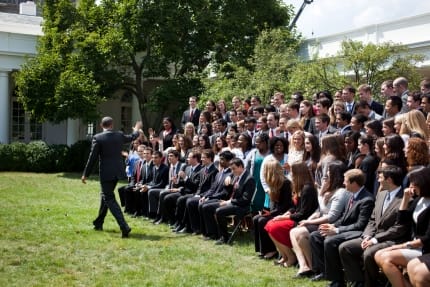
In 2013, thirteen lawsuits have been filed on behalf of interns against their former (non)employers. We regard this as a public service. They are bringing attention to the question of what the word “internship” means.
This author remembers his first internship, undertaken for academic credit while studying abroad. After several weeks of dull work, an employee asked how the internship could better benefit the author. This provoked embarrassment.
The unspoken agreement had always seemed to be that interns do menial work, grateful for a peek inside a chosen field and the opportunity to list the internship on their resume. Perhaps the opportunity to attend an interesting meeting or major company event would be offered. This moment of honesty by an intern supervisor served as a reminder that internships are meant for educational purposes – not paying dues. That something sinister is at work with the internship system.
In America, the Fair Labor Standards Act mandates certain protections afforded to all workers, including a minimum wage. To qualify as an exception, internships must meet the following criteria:
1)The internship, even though it includes actual operation of the facilities of the employer, is similar to training which would be given in an educational environment
2) The internship experience is for the benefit of the intern;
3) The intern does not displace regular employees, but works under close supervision of existing staff
4) The employer that provides the training derives no immediate advantage from the activities of the intern; and on occasion its operations may actually be impeded
5) The intern is not necessarily entitled to a job at the conclusion of the internship
6) The employer and the intern understand that the intern is not entitled to wages for the time spent in the internship.
We suspect that this description would surprise most interns. We suspect that most don’t feel like “trainees” or more like students than workers – the spirit that guided the exception made to labor laws in 1947 when internships only meaningfully existed in medicine (according to Ross Perlin, author of Intern Nation).
We suspect that they would also be surprised by the following explanation provided by the Department of Labor:
In general, the more an internship program is structured around a classroom or academic experience as opposed to the employer’s actual operations, the more likely the internship will be viewed as an extension of the individual’s educational experience… The intern does not perform the routine work of the business on a regular and recurring basis, and the business is not dependent upon the work of the intern.
On the other hand, if the interns are engaged in the operations of the employer or are performing productive work (for example, filing, performing other clerical work, or assisting customers), then the fact that they may be receiving some benefits in the form of a new skill or improved work habits will not exclude them from the FLSA’s minimum wage and overtime requirements because the employer benefits from the interns’ work.
So what exactly is an internship in practice, rather than in theory?
Internships are a means to hire employees for no wages. Maurice Pianko, an attorney and founder of Intern Justice, told New York Magazine that he became interested in the internship issue after reading job postings where “so many descriptions sounded similar to a salaried position, except on the last line it said ‘unpaid.’”
Internships are the scourge of some 50% of college graduates – not just of privileged twentysomethings whose parents support them. A survey by Intern Bridge found that students and graduates with parents making $40,000-$80,000 a year were most likely to work an unpaid internship, whereas the children of parents making over $120,000 were least likely.
Internships are not just about pay, but also labor protections, of which interns are legally entitled to none. Sexual harassment lawsuits have been thrown out under the logic that interns aren’t protected by laws like the Civil Rights Act. In Intern Nation, Ross Perlin describes how poorly paid college interns power Disney World:
Disney runs one of the world’s largest internship programs. Each year, between 7,000 and 8,000 college students and recent graduates work full-time, minimum-wage, menial internships at Disney World.
The interns work entirely at the company’s will, subject to a raft of draconian policies, without sick days or time off, without grievance procedures, without guarantees of workers’ compensation or protection against harassment or unfair treatment. Twelve-hour shifts are typical, many of them beginning at 6 a.m. or stretching past midnight. Interns sign up without knowing what jobs they’ll do or the salaries they’ll be paid (though it typically hovers right near minimum wage).
Internships are a gender equity issue. Seventy seven percent of unpaid interns are women. The reason may be that unpaid internships are prevalent in women dominated fields like fashion, health care, and nonprofits, but it certainly contributes to the pay gap.
Internships are not a good way to land a job. One survey found that graduating seniors with unpaid internship experience did no better than seniors without internship experience at finding a job. Another concluded that a measly 17% of surveyed students received a job offer after their internship. The exception is paid internships, which did lead to job offers.
Internships are a free revenue source for colleges and universities, which pocket thousands of dollars for each student that interns for academic credit. Instead of paying professors to teach their students, they can receive the same tuition money for sanctioning unpaid work under the guise of an educational opportunity.
Internships are an overwhelmingly illegal and cynical practice. With 11 lawsuits in progress, and a victory for two Hollywood interns against the studio where they worked already in the books this year, the courts may finally rule as such.
This post was written by Alex Mayyasi. Follow him on Twitter here or Google Plus. To get occasional notifications when we write blog posts, sign up for our email list.



